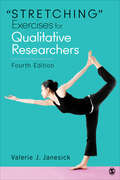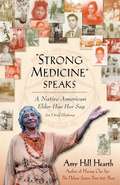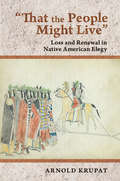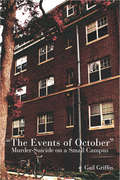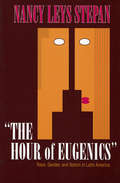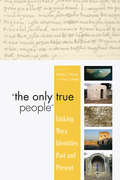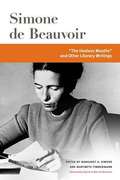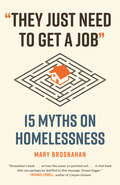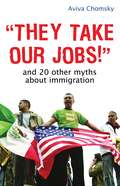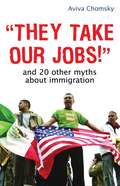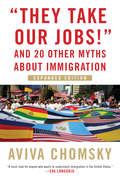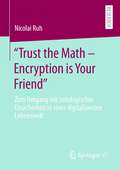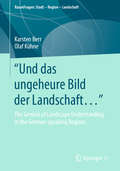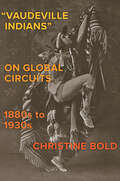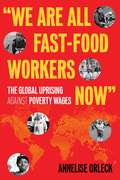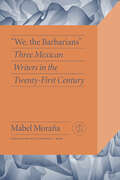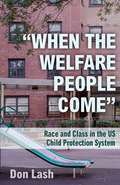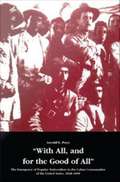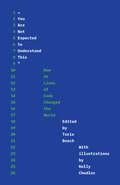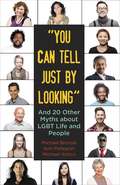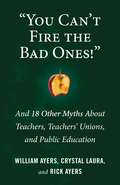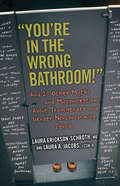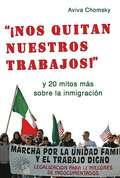- Table View
- List View
"Stretching" Exercises for Qualitative Researchers
by Valerie J. JanesickIn the new Fourth Edition of her inventive, one-of-a-kind book, author Valerie J. Janesick uses dance, yoga, and meditation metaphors to help researchers tap into the intuitive and creative side of their research. In every chapter, "stretching" exercises help readers develop, practice, and hone fieldwork skills and vital habits of mind such as observation, interviewing, writing, creativity, technology, and analysis. While reading the book and working through the exercises, readers can complete a researcher’s reflective journal—an invaluable tool that will remain useful throughout their careers.
"Strong Medicine" Speaks: A Native American Elder Has Her Say
by Amy Hill Hearth"Strong Medicine" Gould is an eighty-five-year-old Elder in her Lenni-Lenape tribe and community. Taking turns with the author as the two women alternate voices throughout this moving book, Strong Medicine tells of her ancestry.
"Sucht" aus körpersoziologischer Perspektive (Sozialwissenschaftliche Gesundheitsforschung)
by Sophie RubscheitDie vorliegende, qualitative Studie beleuchtet die Wechselwirkungen zwischen Körperwissen und Leiberfahrungen im Hinblick auf Sucht. Die empirischen Ergebnisse zeigen, dass es nicht ausreicht, Sucht lediglich als natürlichen Prozess körperlicher bzw. psychischer Vorgänge zu verstehen. Mindestens ebenso bedeutend für die Entstehung und Aufrechterhaltung von Sucht ist das Setting im Sinne des soziokulturell geprägten Suchtwissens. Ein gesundheitsförderlicher Umgang mit Drogengebraucher*innen muss daher immer auch die Wechselwirkungen zwischen Körper und Gesellschaft in Rechnung stellen und Identifikationsmöglichkeiten jenseits der Sucht ermöglichen.
"That the People Might Live": Loss and Renewal in Native American Elegy
by Arnold KrupatThe word "elegy" comes from the Ancient Greek elogos, meaning a mournful poem or song, in particular, a song of grief in response to loss. Because mourning and memorialization are so deeply embedded in the human condition, all human societies have developed means for lamenting the dead, and, in "That the People Might Live" Arnold Krupat surveys the traditions of Native American elegiac expression over several centuries.Krupat covers a variety of oral performances of loss and renewal, including the Condolence Rites of the Iroquois and the memorial ceremony of the Tlingit people known as koo'eex, examining as well a number of Ghost Dance songs, which have been reinterpreted in culturally specific ways by many different tribal nations. Krupat treats elegiac "farewell" speeches of the eighteenth and nineteenth centuries in considerable detail, and comments on retrospective autobiographies by Black Hawk and Black Elk.Among contemporary Native writers, he looks at elegiac work by Linda Hogan, N. Scott Momaday, Gerald Vizenor, Sherman Alexie, Maurice Kenny, and Ralph Salisbury, among others. Despite differences of language and culture, he finds that death and loss are consistently felt by Native peoples both personally and socially: someone who had contributed to the People's well-being was now gone. Native American elegiac expression offered mourners consolation so that they might overcome their grief and renew their will to sustain communal life.
"The Events of October": Murder-Suicide on a Small Campus (Painted Turtle)
by Gail GriffinThe true story of a murder-suicide at Kalamazoo College and its rippling effects on the campus community.
"The Hour of Eugenics": Race, Gender, and Nation in Latin America
by Nancy Leys StepanEugenics was a term coined in 1883 to name the scientific and social theory which advocated "race improvement" through selective human breeding. In Europe and the United States the eugenics movement found many supporters before it was finally discredited by its association with the racist ideology of Nazi Germany. Examining for the first time how eugenics was taken up by scientists and social reformers in Latin America, Nancy Leys Stepan compares the eugenics movements in Mexico, Brazil, and Argentina with the more familiar cases of Britain, the United States, and Germany. In this highly original account, Stepan sheds new light on the role of science in reformulating issues of race, gender, reproduction, and public health in an era when the focus on national identity was particularly intense. Drawing upon a rich body of evidence concerning the technical publications and professional meetings of Latin American eugenicists, she examines how they adapted eugenic principles to local contexts between the world wars. Stepan shows that Latin American eugenicists diverged considerably from their counterparts in Europe and the United States in their ideological approach and their interpretations of key texts concerning heredity.
"The Only True People": Linking Maya Identities Past and Present
by Bethany J. Beyyette and Lisa J. LeCount"The Only True People" is a timely and rigorous examination of ethnicity among the ancient and modern Maya, focusing on ethnogenesis and exploring the complexities of Maya identity—how it developed, where and when it emerged, and why it continues to change over time. In the volume, a multidisciplinary group of well-known scholars including archaeologists, linguists, ethnographers, ethnohistorians, and epigraphers investigate ethnicity and other forms of group identity at a number of Maya sites and places, from the northern reaches of the Yucatan to the Southern Periphery, and across different time periods, from the Classic period to the modern day. Each contribution challenges the notion of ethnically homogenous "Maya peoples" for their region and chronology and explores how their work contributes to the definition of "ethnicity" for ancient Maya society. Contributors confront some of the most difficult theoretical debates concerning identity in the literature today: how different ethnic groups define themselves in relation to others; under what circumstances ethnicity is marked by overt expressions of group membership and when it is hidden from view; and the processes that transform ethnic identities and their expressions. By addressing the social constructs and conditions behind Maya ethnicity, both past and present, "The Only True People" contributes to the understanding of ethnicity as a complex set of relationships among people who lived in real and imagined communities, as well as among people separated by social boundaries. The volume will be a key resource for Mayanists and will be of interest to students and scholars of ethnography, anthropology, and cultural studies as well. Contributors: McCale Ashenbrener, Ellen E. Bell, Marcello A. Canuto, Juan Castillo Cocom, David A. Freidel, Wolfgang Gabbert, Stanley P. Guente, Jonathan Hill, Charles Andrew Hofling, Martha J. Macri, Damien B. Marken, Matthew Restall, Timoteo Rodriguez, Mathew C. Samson, Edward Schortman, Rebecca Storey
"The Useless Mouths" and Other Literary Writings
by Simone De Beauvoir Sylvie Le Beauvoir Margaret A. Simons Marybeth Timmermann"The Useless Mouths" and Other Literary Writings brings to English-language readers literary writings--several previously unknown--by Simone de Beauvoir. Culled from sources including various American university collections, the works span decades of Beauvoir's career. Ranging from dramatic works and literary theory to radio broadcasts, they collectively reveal fresh insights into Beauvoir's writing process, personal life, and the honing of her philosophy. The volume begins with a new translation of the 1945 play "The Useless Mouths," written in Paris during the Nazi occupation. Other pieces were discovered after Beauvoir's death in 1986, such as the 1965 short novel Misunderstanding in Moscow, involving an elderly French couple who confront their fears of aging. Two additional previously unknown texts include the fragmentary "Notes for a Novel," which contains the seed of what she later would call "the problem of the Other," and a lecture on postwar French theater titled "Existential Theater." The collection notably includes the eagerly awaited translation of Beauvoir's contribution to a 1965 debate among Jean-Paul Sartre and other French writers and intellectuals, "What Can Literature Do?" Prefaces to well-known works such as Bluebeard and Other Fairy Tales,La Bâtarde, and James Joyce in Paris: His Final Years are also available in English for the first time, alongside essays and other short articles. A landmark contribution to Beauvoir studies and French literary studies, the volume includes informative and engaging introductory essays by prominent and rising scholars. Contributors are Meryl Altman, Elizabeth Fallaize, Alison S. Fell, Sarah Gendron, Dennis A. Gilbert, Laura Hengehold, Eleanore Holveck, Terry Keefe, J. Debbie Mann, Frederick M. Morrison, Catherine Naji, Justine Sarrot, Liz Stanley, Ursula Tidd, and Veronique Zaytzeff.
"They Just Need to Get a Job": 15 Myths on Homelessness (Myths Made in America #10)
by Mary Brosnahan&“Readers will come away infuriated, with a greater understanding of the systemic causes of homelessness, and with more compassion for their homeless neighbors. Essential reading for any community affected by homelessness (which is all of them).&” —Booklist, Starred ReviewFor readers of Andrea Elliott and Matthew Desmond, the former CEO of the Coalition for the Homeless breaks through the highly destructive misinformation surrounding our homeless neighborsConservative think tanks like the Manhattan Institute disseminate anti-homeless myths in the media, legislatures, and the larger culture, claiming that our homeless neighbors cause their own predicament and that the best we can do is manage the problem.Drawing on her deep legal knowledge, policy expertise, and decades of frontline service, Mary Brosnahan cuts through the misinformation to deliver two important messages: that homelessness ultimately stems from a lack of investment in affordable housing; and that the greatest myth of all is that we should have no hope. In fact, the proven solutions are well documented, and the ability to enact them depends on us all.Brosnahan takes a nationwide look from New York to Detroit, Philly to L.A., and from rural areas such as Cumberland County, Pennsylvania to debunk 15 widespread misconceptions, including:that the problem is inevitable (in fact, Housing First approaches have shown great success)that &“handouts&” cause homelessness (in fact, the primary causes are flat wages and high rent)that homeless people need to prove that they&’re &“ready&” to receive aid (in fact, enforcing hurdles is far more expensive and less effective than Housing First).With brilliant insight, Brosnahan showcases how by dispelling these pervasive myths rooted in fear, we can embrace the affordable, housing-based solutions that will bring our impoverished neighbors home.
"They Take Our Jobs!" And 20 Other Myths About Immigration: And 20 Other Myths about Immigration (Myths Made in America)
by Aviva ChomskyIn the spirit of her famous father, Chomsky (Latin American studies, Salem State College, Massachusetts) has been active in Latin American solidarity and immigrant rights issues for over a quarter of a century. Among the myths she dispels are that immigrants send most of what they earn out of the country, they threaten the national culture by refusing to assimilate, that countries need to control who goes in and out, and that the American public opposes immigration. She has not indexed her work. Annotation ©2008 Book News, Inc., Portland, OR (booknews.com)
"They Take Our Jobs!": And Twenty Other Myths About Immigration
by Aviva Chomsky[Back cover] IN THIS GROUNDBREAKING WORK, Aviva Chomsky dismantles twenty-one of the most widespread myths and beliefs about immigrants and immigration. "They Take Our Jobs!" challenges the underlying assumptions that fuel these misinformed claims about immigrants, radically altering our notions of citizenship, discrimination, and U.S. history.
"They Take Our Jobs!": and 20 Other Myths about Immigration, Expanded Edition
by Aviva ChomskyRevised and expanded edition of the groundbreaking book which demystifies twenty-one of the most widespread myths and beliefs about immigrants and immigrations.Aviva Chomsky dismantles twenty-one of the most widespread and pernicious myths and beliefs about immigrants and immigration in this incisive book. "They Take Our Jobs!" challenges the underlying assumptions that fuel misinformed claims about immigrants, radically altering our notions of citizenship, discrimination, and US history. With fresh material including a new introduction, revised timeline, and updated terminology section, this expanded edition is essential reading for anyone who wants to understand how these myths are used to promote aggressive anti-immigrant policies.
"Thinspire me": Zur Soziologie der sozialen Welt 'Pro-Ana' im Internet (Wissen, Kommunikation und Gesellschaft)
by Anja SchünzelUnter dem Motto „Pro-Ana“ treffen sich seit den späten 1990er Jahren vorwiegend junge Frauen im Internet, um gemeinsam magersüchtig zu werden. Wissenschaftlich wurde das Phänomen bisher vor allem hinsichtlich seiner potentiellen Gefahren untersucht. Im Dunkeln blieb dabei, was Pro-Ana eigentlich ist, welche Handlungen im Zentrum des Phänomens stehen oder wie sich Pro-Ana plattformübergreifend strukturiert. Dabei ist von besonderem Interesse, wie das soziale Gefüge der Teilnehmer*innen vor dem Hintergrund fast ausschließlich digital erfolgender Kommunikation dauerhaft bestehen kann. Über eine soziologische Websiteanalyse wird gezeigt, dass die Teilnehmer*innen die Online-Gemeinschaft in erster Linie als eine Motivationstechnik nutzen, die sie bei ihrem Vorhaben der drastischen Gewichtsreduktion unterstützt. Sie suchen diese auf, um sich in einer Art „Parallelprojektierung“ wechselseitig zum Abnehmen zu inspirieren und zu motivieren: Ihre Gleichheit in Bezug auf Projektziele und -dokumentationen ermöglicht es den Teilnehmer*innen, sich online etwa in Wettbewerben zu messen und einander als Gemeinschaft zu erfahren. Ihre Differenzen im Projektfortschritt bilden hingegen die Voraussetzung dafür, leuchtende Vorbilder unter ihren Mitstreiter*innen zu finden, die den Glauben an die Machbarkeit eines pro-anorektischen Gewichtsabnahmeprojekts in entscheidendem Maße stützen.
"Trust the Math – Encryption is Your Friend": Zum Umgang mit ontologischer Unsicherheit in einer digitalisierten Lebenswelt
by Nicolai RuhDie an der Schnittstelle von Phänomenologie und Science and Technology Studies angesiedelte wissenssoziologische Arbeit rekonstruiert die Binnenperspektive einer transdisziplinären Expertengemeinde auf die manipulationsanfälligen technischen Grundlagen eines sich im Entstehen befindenden globalen Sozialraums. Indem sie die kollektiven Wissenspraktiken jener Experten fokussiert, die mit ihren Technologien die ontologischen Konstitutionsbedingungen einer zunehmend netzvermittelten Lebenswelt vor Manipulation zu schützen versuchen, öffnet die Studie in mehrerlei Hinsicht eine Blackbox für die sozialwissenschaftliche Forschung: Sie durchleuchtet zum einen die opake Tiefenstruktur eines netzvermittelten sozialen Wirk- und Erfahrungsraums in seinen Dimensionen des Wissens und Nichtwissens. Zum anderen zeichnet sie eine theoretische Haltung der "ontologischen Verunsicherung" nach. Diese nehmen die Gestalter dieses sozio-technischen Wirkraums ein, wenn die dessen Grundlagen vor sozialen Kontingenzfaktoren zu schützen versuchen. Wie die Arbeit zeigt, enden diese Versuche der mathematischen Auflösung sozialer Kontingenzfaktoren jedoch in einem endlosen Regress.
"Und das ungeheure Bild der Landschaft…“: The Genesis of Landscape Understanding in the German-speaking Regions (RaumFragen: Stadt – Region – Landschaft)
by Olaf Kühne Karsten BerrThe understanding of landscape in the German-speaking area has some similarities with the discussions of the topic in other European languages and scientific communities, but there are some specifics. These specifics can be found both in the common sense understanding of landscape and in the history of scientific conceptualization. Special features of the common sense understanding lie on the one hand in the medieval roots, a strong romantic charge and the strong connection between home and landscape. With regard to the scientific examination of landscape, there are specific fractions and discontinuities in the German-speaking world.Contents• Theoretical Framing: the Creation of Landscape• The Genesis of the Landscape Concept in the German Language Regions – the Common Sense Understanding• The Concept of Landscape in Landscape-Related Sciences• Landscape Research in its Interdisciplinary and Transdisciplinary ChallengeAbout the AuthorsDr. Karsten Berr works as a research assistant at the Department for Urban and Regional Development at the Eberhard Karls University Tübingen.Dr. Dr. Olaf Kühne is professor for Urban and Regional Development at the Eberhard Karls University Tübingen.
"Vaudeville Indians" on Global Circuits, 1880s-1930s (The Henry Roe Cloud Series on American Indians and Modernity)
by Christine BoldUncovering hidden histories of Indigenous performers in vaudeville and in the creation of western modernity and popular culture Drawing from little-known archives, Christine Bold brings to light forgotten histories of Indigenous performers in vaudeville and, by extension, popular culture and modernity. Vaudeville was both a forerunner of modern mass entertainment and a rich site of popular Indigenous performance and notions of Indianness at the turn of the twentieth century. Tracing the stories of artists Native to Turtle Island (North America) performing across the continent and around the world, Bold illustrates a network of more than 300 Indigenous and Indigenous-identifying entertainers, from Will Rogers to Go-won-go Mohawk to Princess Chinquilla, who upend vaudeville&’s received history. These fascinating stories cumulatively reveal vaudeville as a space in which the making of western modernity both denied and relied on living Indigenous presence, and in which Indigenous artists negotiated agency and stereotypes through vaudeville performance.
"We Are All Fast-Food Workers Now": The Global Uprising Against Poverty Wages
by Annelise OrleckThe story of low-wage workers rising up around the world to demand respect and a living wage.Tracing a new labor movement sparked and sustained by low-wage workers from across the globe, "We Are All Fast-Food Workers Now" is an urgent, illuminating look at globalization as seen through the eyes of workers-activists: small farmers, fast-food servers, retail workers, hotel housekeepers, home-healthcare aides, airport workers, and adjunct professors who are fighting for respect, safety, and a living wage. With original photographs by Liz Cooke and drawing on interviews with activists in many US cities and countries around the world, including Bangladesh, Cambodia, Mexico, South Africa, and the Philippines, it features stories of resistance and rebellion, as well as reflections on hope and change as it rises from the bottom up.
"We, the Barbarians": Three Mexican Writers in the Twenty-First Century (Critical Mexican Studies)
by Mabel Moraña&“We, the Barbarians&” embarks on a careful and exhaustive reading of three of the most prominent authors in the latest wave of Mexican fiction: Yuri Herrera, Fernanda Melchor, and Valeria Luiselli. Originally published in Mexico in 2021, this work is divided into three parts, one for each author&’s narrative production. The book analyzes all of the literary works published by Herrera, Melchor, and Luiselli from the beginning of their writing careers until 2021, allowing for a diachronic interpretation of their respective narrative projects as well as for comparative approaches to their aesthetic and ideological contours. Characterized by the fragmentation of civil society and the decomposition of the myths that accompanied the consolidation of the modern nation, Mexican visual and literary arts have explored a myriad of representational avenues to approach the phenomena of violence, institutional decay, and political instability. The critical and theoretical approaches in &“We, the Barbarians&” explore a variety of alternative symbolic representations of topics such as nationalism, community, and affect in times impacted by systemic violence, precariousness, and radical inequality. Moraña perceives the negotiations between regional/local imaginaries and global scenarios characterized by the devaluation and resignification of life, both at individual and collective levels. Though it uses three authors as its focus, this book seeks to more broadly theorize the question of the relationship between literature and the social in the twenty-first century.
"When the Welfare People Come": Race and Class in the US Child Protection System
by Don Lash&“[An] excellent overview of the child welfare system . . . Most importantly, [the author] provides a discussion of how to create true change.&” —Tina Lee, author of Catching a Case: Inequality and Fear in New York City's Child Welfare System A groundbreaking look at the history and politics of the American child welfare system, &“When the Welfare People Come&” exposes the system in its totality, from child protective investigation to foster care and mandated services, arguing that it constitutes a mechanism of control exerted over poor and working class parents and children. Applying the Marxist framework of social reproduction theory to the child welfare system, the author, an attorney who has practiced in the area of child welfare for more than twenty years, reveals the system&’s role in the regulation of family life under capitalism. &“This book&’s description and analysis of child welfare is terrific. Though I&’ve worked in the field of child welfare for four decades, I learned not only new information but also found new, resonant analyses.&” —David Tobis, PhD, Author of From Pariahs to Partners: How Parents and Their Allies Changed New York City&’s Child Welfare System
"With All, and for the Good of All": The Emergence of Popular Nationalism in the Cuban Communities of the United States, 1848-1898
by Gerald E. PoyoCuban-Americans are beginning to understand their long-standing roots and traditions in the United States that reach back over a century prior to 1959. This is the first book-length confirmation of those beginnings, and its places the Cuban hero and revolutionary thinker Jos Mart within the political and socioeconomic realities of the Cuban communities in the United States of that era. By clarifying Mart's relationship with those communities, Gerald E. Poyo provides a detailed portrait of the exile centers and their role in the growth and consolidation of nineteenth-century Cuban nationalism. Poyo differentiates between the development of nationalist sentiment among liberal elites and popular groups and reveals how these distinct strains influenced the thought and conduct of Mart and the successful Cuban revolution of the 1890s.
"You Are Not Expected to Understand This": How 26 Lines of Code Changed the World
by Kelly ChudlerLeading technologists, historians, and journalists reveal the stories behind the computer coding that touches all aspects of life—for better or worseFew of us give much thought to computer code or how it comes to be. The very word “code” makes it sound immutable or even inevitable. “You Are Not Expected to Understand This” demonstrates that, far from being preordained, computer code is the result of very human decisions, ones we all live with when we use social media, take photos, drive our cars, and engage in a host of other activities.Everything from law enforcement to space exploration relies on code written by people who, at the time, made choices and assumptions that would have long-lasting, profound implications for society. Torie Bosch brings together many of today’s leading technology experts to provide new perspectives on the code that shapes our lives. Contributors discuss a host of topics, such as how university databases were programmed long ago to accept only two genders, what the person who programmed the very first pop-up ad was thinking at the time, the first computer worm, the Bitcoin white paper, and perhaps the most famous seven words in Unix history: “You are not expected to understand this.”This compelling book tells the human stories behind programming, enabling those of us who don’t think much about code to recognize its importance, and those who work with it every day to better understand the long-term effects of the decisions they make.With an introduction by Ellen Ullman and contributions by Mahsa Alimardani, Elena Botella, Meredith Broussard, David Cassel, Arthur Daemmrich, Charles Duan, Quinn DuPont, Claire L. Evans, Hany Farid, James Grimmelmann, Katie Hafner, Susan C. Herring, Syeda Gulshan Ferdous Jana, Lowen Liu, John MacCormick, Brian McCullough, Charlton McIlwain, Lily Hay Newman, Margaret O’Mara, Will Oremus, Nick Partridge, Benjamin Pope, Joy Lisi Rankin, Afsaneh Rigot, Ellen R. Stofan, Lee Vinsel, Josephine Wolff, and Ethan Zuckerman.
"You Can Tell Just By Looking": And 20 Other Myths about LGBT Life and People (Myths Made in America #9)
by Michael Bronski Ann Pellegrini Michael AmicoBreaks down the most commonly held misconceptions about lesbian, gay, bisexual, and transgender people and their lives In "You Can Tell Just by Looking" three scholars and activists come together to unpack enduring, popular, and deeply held myths about lesbian, gay, bisexual, and transgender people, culture, and life in America. Myths, such as "All Religions Condemn Homosexuality" and "Transgender People Are Mentally Ill," have been used to justify discrimination and oppression of LGBT people. Others, such as "Homosexuals Are Born That Way," have been embraced by LGBT communities and their allies. In discussing and dispelling these myths--including gay-positive ones--the authors challenge readers to question their own beliefs and to grapple with the complexities of what it means to be queer in the broadest social, political, and cultural sense.From the Trade Paperback edition.
"You Can't Fire the Bad Ones!": And 18 Other Myths about Teachers, Teachers Unions, and Public Education
by William Ayers Crystal Laura Rick AyersOverturns common misconceptions about charter schools, school "choice," standardized tests, common core curriculum, and teacher evaluations.Three distinguished educators, scholars, and activists flip the script on many enduring and popular myths about teachers, teachers' unions, and education that permeate our culture. By unpacking these myths, and underscoring the necessity of strong and vital public schools as a common good, the authors challenge readers--whether parents, community members, policy makers, union activists, or educators themselves--to rethink their assumptions.
"You're in the Wrong Bathroom!": And 20 Other Myths and Misconceptions About Transgender and Gender-Nonconforming People
by Laura A. Jacobs Laura Erickson-SchrothDebunks the twenty-one most common myths and misperceptions about transgender issuesFrom Laverne Cox and Caitlyn Jenner to Thomas Beatie (“the pregnant man”) and transgender youth, coverage of trans lives has been exploding—yet so much misinformation persists. Bringing together the medical, social, psychological, and political aspects of being trans in the United States today, “You’re in the Wrong Bathroom!”: And 20 Other Myths About Transgender and Gender-Nonconforming People unpacks the twenty-one most common myths and misconceptions about transgender and gender-nonconforming people. Authors Laura Erickson-Schroth, MD, a psychiatrist, and Laura A. Jacobs, LCSW-R, a psychotherapist, address a range of fallacies:Trans People Are “Trapped in the Wrong Body”You’re Not Really Trans If You Haven’t Had “the Surgery”Trans People Are a Danger to Others, Especially ChildrenTrans People Are Mentally Ill and Therapy Can Change ThemTrans People and Feminists Don’t Get Along
"¡Nos Quitan Nuestros Trabajos!"
by Aviva Chomsky"An indispensable guide to the current debate on immigration."-Howard ZinnAviva Chomsky dismantles twenty-one of the most widespread myths and beliefs about immigrants and immigration. "¡Nos Quitan el Trabajo!" challenges the underlying assumptions that fuel these misinformed claims about immigrants, radically altering our notions of citizenship, discrimination, and US history.
